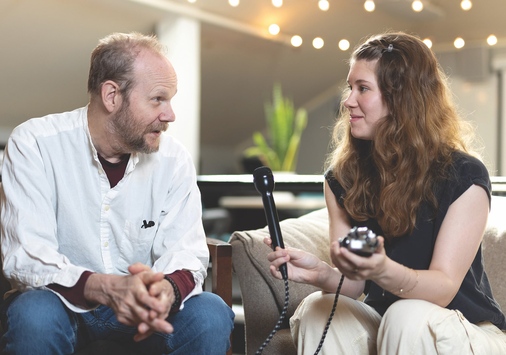
Barento Taha was the only man in many rooms over the last three years.
Surrounded by working class mothers and female academics, Taha immersed himself in the topic of female medical racism. Taha’s brief experience as the gender minority, then, could almost be considered part of his research.
During a recent campus visit with global health, sociology and journalism/English classes, Taha discussed the evolution of his life from pre-med student to the field of public health and ultimately producing the award-winning documentary Risk Factor based on his research.
Taha grew up in Central Ohio before spending his undergraduate and graduate time at The Ohio State University with aspirations of becoming a physician. However, in the midst of four years as a neuroscience pre-med student, one internship experience changed his outlook on the field.
“What sparked the shift was how the physicians I encountered were approaching medicine with their public health degrees, not necessarily their MDs,” Taha said. “My imagination regarding what doctors ‘do’ was extremely limited, so this opened the door for my thinking.”
Until this internship, which was focused on the goal to increase diversity in medical schools, he spent his pre-med years oblivious to the roots of racism present in so much of medicine. Quickly, though, he came to discover the incredible oppression in specifically gynecology and reproductive healthcare. This dark side of medicine deepened his interest in the field and turned him away from medical school and on to the discipline of public health.
While taking organic chemistry and anatomy classes as an undergraduate, Taha also developed a deep interest in filmmaking. Without the room in his schedule to fit in actual courses on the subject, he made it a practice to walk into the film department and talk to anyone he could find. He knew nothing but the fact that he felt drawn to this form of storytelling.
“You get looked at weirdly as a pre-med student in film,” Taha said. “Medicine is very rigid. Public health, on the other hand, did me one better. The field is so flexible and enthusiastic about creativity. There’s really something about people bold enough to try something brand new to fix a problem.”
After graduation, he decided to dig deep into the topic of infant mortality and the medical oppression of black women. He blindly began a project and started talking with everyone he could find – black female academics about what they would want to know, and black mothers about what they would want to share.
“Really, it was a labor of love. It stemmed from the smallest spark of curiosity, and it grew over three long years,” said Taha.
Soon enough, Risk Factor was born: an award-winning documentary detailing the oppression of black women in gynecology and the resulting crisis of infant mortality. Taha spent longer on this project than most filmmakers spend on two pieces of this size, but he sculpted pure heart, sensitivity, and fire into a twenty-minute film.
Now working for the “social impact” division of MTV, it is clear to see Taha has found his niche in the world. With palpable energy and passion, he will no doubt continue to push boundaries in the long fight toward racial justice in the medical field.
And his work is inspiring Denison students and faculty across disciplines and spurring them on.
This campus visit was funded in part by the Andrew W. Mellon “Writing in Place” initiative and a gift by alumna Sue Douthit O’Donnell ‘67.














